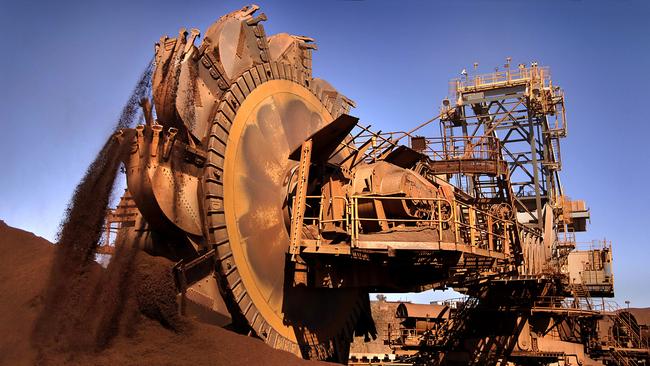Rio Tinto warns of iron ore hit as steelmakers attempt to avert climate risk
Rio Tinto has warned iron ore may struggle to compete as the world makes the switch to a low-emissions economy.

Rio Tinto has warned its biggest revenue earner, iron ore, may struggle to compete as the world switches to a low-emissions economy and says the poor outlook for thermal coal drove its decision to axe the fossil fuel from its portfolio.
Limiting global warming to 2 degrees celsius above pre-industrial levels raises questions about the ability of steel producers to decarbonise at an affordable cost to consumers and the economy given their high greenhouse gas emissions, Rio says.
“There is large uncertainty around how the steel production sector will decarbonise in the long run, which could materially affect the value of Rio Tinto’s iron ore business,” Rio said in a climate change report today. “In addition to an escalation of the severity of the medium-term impacts, there is a need to plan for greater frequency and intensity of cyclones on the Pilbara coast.”
While it expects a potential carbon price on emissions would hit lower-grade ore rather than its own premium material, it also points out that as a diversified miner its tier one copper and aluminium assets might benefit from such climate change policies.
Demand for copper may increase from growing electrification, batteries may boost lithium while low-carbon branded aluminium can also tap customer demand for “green metals”.
“The relative cost position of most of our assets is expected to remain robust within their respective industry cost curves,” Rio says.
The dual-listed miner (RIO) has lowered its emissions intensity by 30 per cent since 2008 and says its on track to beat a target of a 24 per cent from a decade ago by 2020. Future emissions targets will also be set before 2020.
Rio’s exit from coal last year to focus on iron ore and copper was based on its bearish view of the commodity and its ability to cash in via sales of its Australian assets to Yancoal and Glencore.
“We are now the only large diversified mining company which no longer has coal in its portfolio,” Rio said. “Our decision to divest from fossil fuels was informed by the market outlook for thermal coal and our ability to realise full value for the assets.”
Rio also said it had held talks with the Climate Action 100+ initiative which controls $US32 trillion ($45tn) in global funds and includes Australian investors AustralianSuper, AMP Capital, Cbus, IFM Investors, QSuper and BT Financial Group.
Australia’s largest coal producer, Glencore, said last week it would abandon the pursuit of large coal acquisitions and freeze production at current levels to help address climate change concerns following pressure from Climate Action 100+ members for the fossil fuel to be phased out.
In Australia, coal recently pipped iron ore as the country’s largest export earner. Australia exported $66.2 billion worth of thermal and coking coal last year, the highest amount ever recorded, due in large part due to soaring coal prices.
However, new mines face a much tougher test to receive regulatory approvals due to community and investor concern over environmental impacts and the threat of new coal facilities becoming stranded assets in the face of cheaper clean alternatives.



To join the conversation, please log in. Don't have an account? Register
Join the conversation, you are commenting as Logout